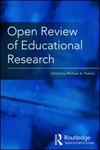Teachers’ reflective practice in the context of twenty-first century learning: applying Vagle’s five-component post-intentional plan for phenomenological research
Q1 Arts and Humanities
引用次数: 2
Abstract
ABSTRACT Vagle’s ‘post-intentional phenomenological research approach’ applies post-structural thinking to intentionality. I apply his five-component research process, reflect on some initial findings of semi-structured interview discussions with 25 participants, and consider a meta-reflection by some participants on those findings. My larger on-going qualitative research programme is framed by the question: What is the influence of the concept of ‘twenty-first century learning’ on the work of teachers and the strategic actions of leaders at a selection of New Zealand schools? ‘Twenty-first century learning’ manifests in mandated curricula in the form of the skills, competencies, dispositions and attributes required for productive citizenship. In tandem is the parallel shift to digital pedagogies, increasingly enacted in flexible learning spaces. In interviews, participants considered teachers’ reflective practice in relation to teaching and leadership approaches suited to twenty-first century learning. Selected participants further reflected on and responded to these findings. This article demonstrates research in action, and to emphasise the point, should be read following a reading of an earlier article published in this journal [Benade, L. (2015a). Teachers’ critical reflective practice in the context of twenty-first century learning. Open Review of Educational Research, 2(1), 42–54.]21世纪学习背景下教师的反思实践:运用瓦格尔的五分量后意向计划进行现象学研究
瓦格尔的“后意向性现象学研究方法”将后结构思维应用于意向性研究。我采用了他的五要素研究过程,反思了与25名参与者进行的半结构化访谈讨论的一些初步发现,并考虑了一些参与者对这些发现的元反思。我正在进行的更大的定性研究计划是由以下问题构成的:“21世纪学习”的概念对新西兰一些学校教师的工作和领导者的战略行动有什么影响?“21世纪学习”体现在强制性课程中,其形式是培养富有成效的公民所需的技能、能力、性格和属性。与此同时,向数字化教学法的并行转变越来越多地体现在灵活的学习空间中。在访谈中,参与者认为教师的反思性实践与适合21世纪学习的教学和领导方法有关。选定的参与者进一步思考和回应了这些发现。这篇文章展示了行动中的研究,为了强调这一点,应该在阅读本杂志上发表的一篇较早的文章之后阅读[Benade, L. (2015a)]。21世纪学习背景下教师的批判性反思实践。教育研究开放,2(1),42-54。
本文章由计算机程序翻译,如有差异,请以英文原文为准。
求助全文
约1分钟内获得全文
求助全文
来源期刊

Open Review of Educational Research
EDUCATION & EDUCATIONAL RESEARCH-
CiteScore
2.60
自引率
0.00%
发文量
0
审稿时长
22 weeks
 求助内容:
求助内容: 应助结果提醒方式:
应助结果提醒方式:


